
1992 Kyoto Prize Laureates
Life Sciences and Medicine(Molecular Biology, Cell Biology, Systems Biology, etc.)
/ Biochemist
1932 - 2004
Professor, Kobe University
1992
11 /11 Wed
Place:Kyoto International Conference Center
Studies and Perspective of Cell Signaling Network
1992
11 /12 Thu
13:10 - 17:20
Place:Kyoto International Conference Center
A biochemist who has given a tremendous impetus to the development of life sciences. He has contributed greatly to the construction of the fundamental concepts of intracellular signal transduction cascade through his discovery of “protein kinase C,” also known as “C kinase,” and his analysis of its function, which revealed a new intracellular signal transduction system and elucidated the regulatory mechanisms involved in many biological phenomena, including cancer cell growth.
*This field then was Field of Life Sciences (Molecular Biology, Cell Biology, Neurobiology).
Dr. Yasutomi Nishizuka is an eminent biochemist who, through his discovery and analysis of protein kinase C, also known as C kinase, has elucidated a new intracellular signal transduction system, thereby clarifying regulatory mechanisms for a great variety of biological phenomena as well as tumorgenesis, and exerting a major influence upon the progress of the life sciences.
In 1977, Dr. Nishizuka discovered a calcium ion-activated, cyclic nucleotide-independent protein kinase and designated his enzyme “C kinase.”
A particularly important research result obtained by Dr. Nishizuka in connection with C kinase was the discovery that this enzyme is activated in coordination with calcium ions by a second messenger, diacylglycerol, produced by hydrolysis of phospholipids contained in the cell membranes. This revealed the existence of a new protein kinase system.
Subsequently, Dr. Nishizuka demonstrated that, through calcium ions and the metabolism of phospholipids, C kinase serves to transmit external information to cells in the manner of an amplifier, and that the tumorgenic promoter phorbol ester activates C kinase, indicating that C kinase is intimately involved in the mechanisms of cell proliferation and tumorgenesis.
Furthermore, during the latter half of the 1980s, Dr. Nishizuka succeeded in cloning C kinase genes. He pointed out the existence of several types of C kinase and demonstrated that these various enzymes act by sharing functions in a complex information transmission system.
Through the discovery of a key enzyme and intensive research in connection with this enzyme, the achievements of Dr. Nishizuka established the existence of an intracellular signal transduction mechanism as the pivot of a major system governing various biological functions. In the years 1984 and 1986, his research papers summarizing these results ranked first in the world in terms of frequency of citation in the literature, thus reflecting the interest evoked by these results in international scientific circles. This series of research achievements by Dr. Nishizuka has had an incalculably vast impact in the fields of biology and medicine.
This record of outstanding research achievements duly attests to the preeminent qualifications of Dr. Yasutomi Nishizuka as the laureate of the 1992 Kyoto Prize for Basic Sciences.
Profile is at the time of the award.